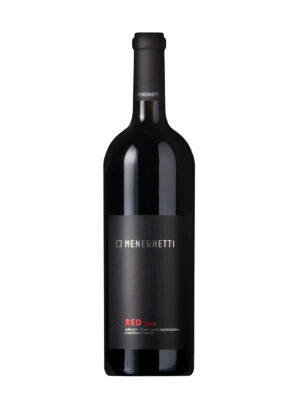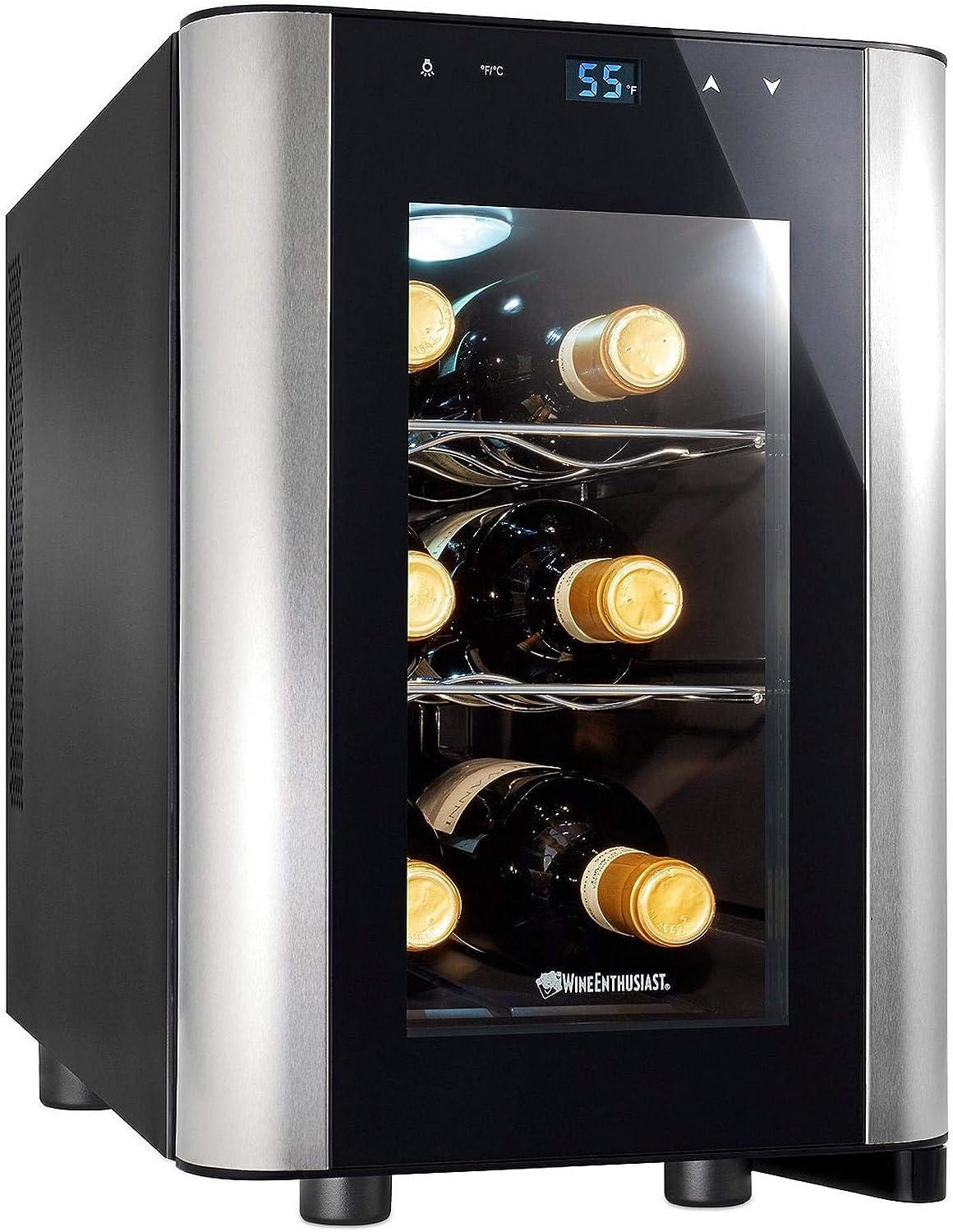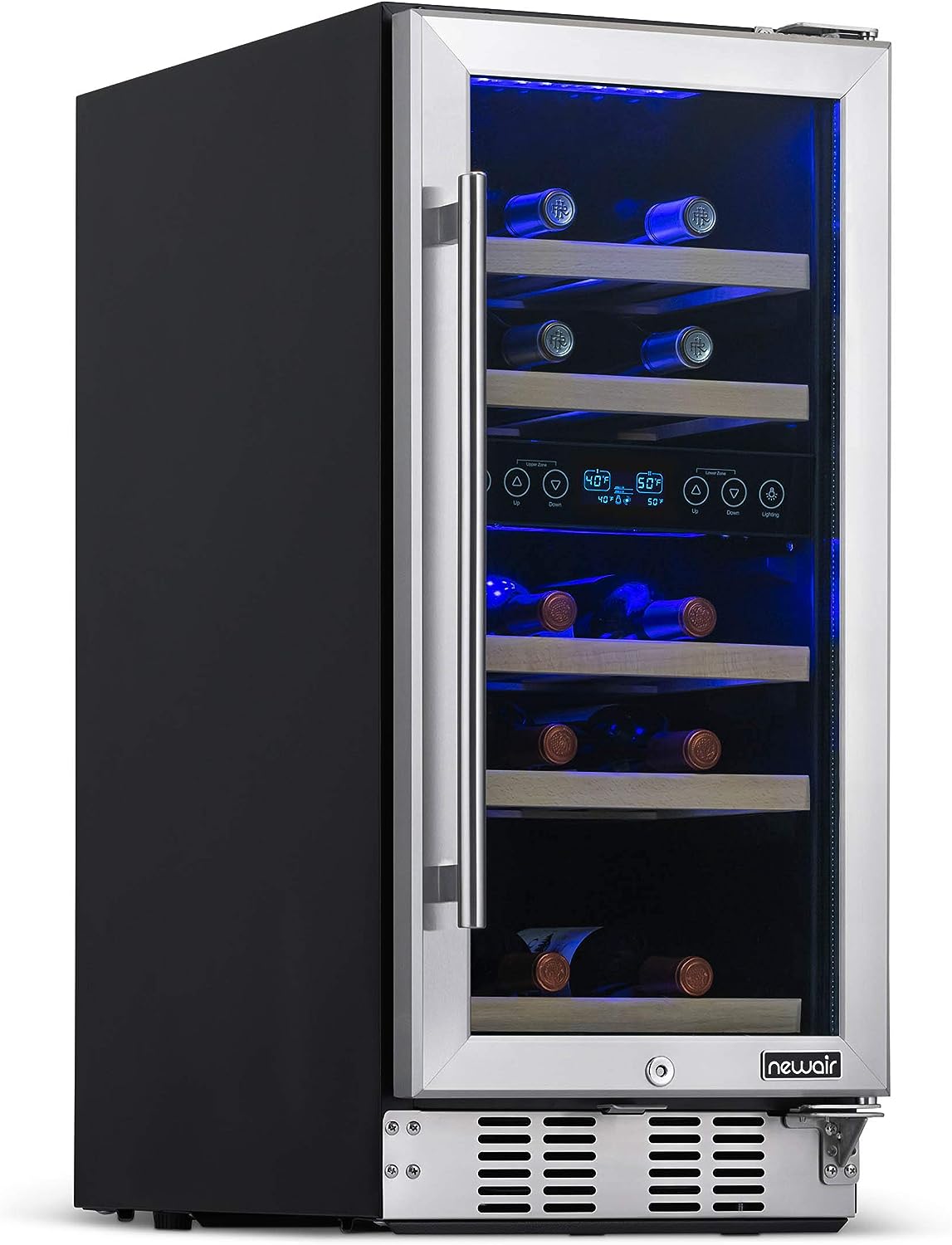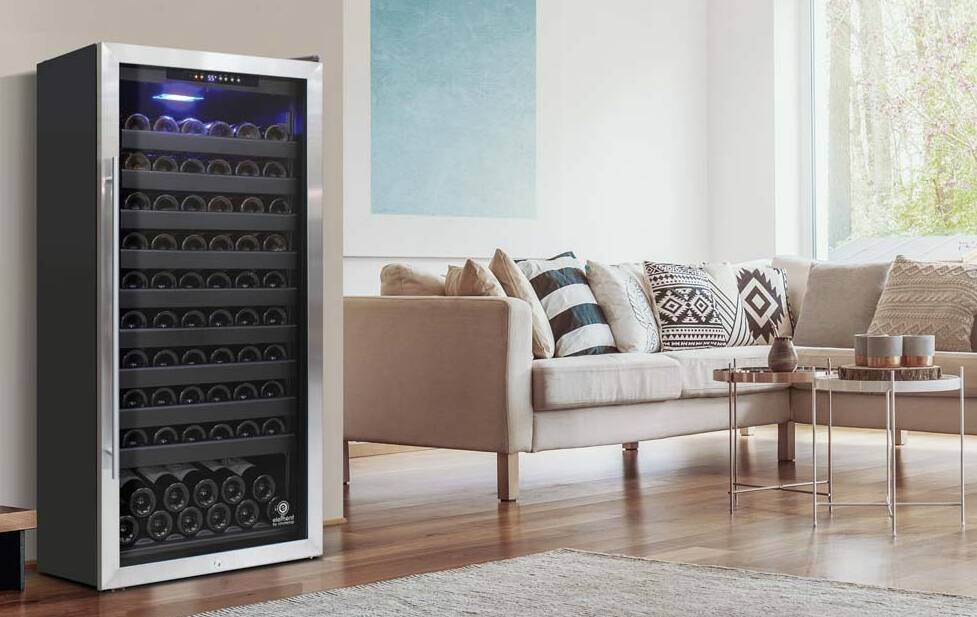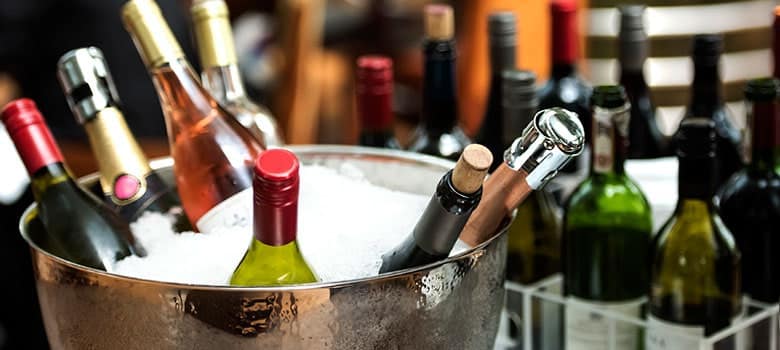How To Choose Your Wine Cooler
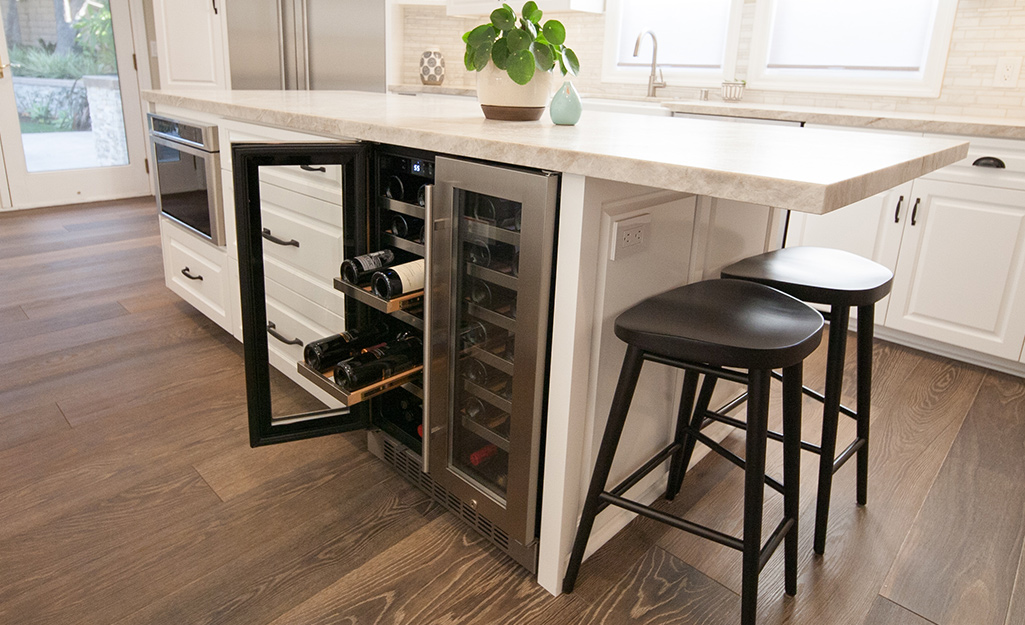
Proper storage is crucial for enjoying wine at its finest. Whether you’re a casual wine enthusiast or a connoisseur with a growing collection, a wine cooler can make all the difference in preserving the flavors and aromas of your favorite bottles. However, with a variety of options available on the market, selecting the perfect wine cooler for your needs can be challenging. In this comprehensive buying guide, we’ll explore the world of wine coolers, revealing the essential features, styles, and considerations to help you make the right choice.
The importance of wine storage
Wine is a delicate beverage easily affected by temperature, humidity, and light. Proper storage conditions are essential to maintain its quality and aging potential. A wine cooler provides a controlled environment that keeps your wines in optimal condition.
The science behind wine storage
Wine is a living, breathing entity that evolves over time. It is the result of a delicate dance between acidity, tannins, and complex compounds that develop as it matures.
The journey from vine to bottle is carefully crafted by winemakers, but what happens after the bottle is sealed is equally crucial. Temperature, humidity, light, and vibration are all factors that can either enhance or deteriorate your wine.
- Temperature: Wine is sensitive to temperature fluctuations. Ideally, wine should be stored at a constant temperature between 45°F and 65°F (7°C to 18°C) and served at the right temperature. Fluctuations can cause the cork to expand and contract, allowing air to seep in and spoil the wine.
- Humidity: Maintaining the right humidity levels (around 70%) is essential to prevent the cork from drying out. A dry cork can lead to oxidation and spoilage.
- Light: Ultraviolet (UV) rays from sunlight can degrade wine. That’s why wine bottles are typically dark-colored – to protect the contents from harmful light exposure.
- Vibration: Even subtle vibrations, such as those from a nearby washing machine or loud music, can negatively impact wine aging by disrupting the sediments.
The role of wine racks and storage units
Now that we understand the science, let’s explore the ways to store wine:
- Wine racks: Wine racks come in various designs and materials, from wooden shelves to metal grids. They are not just for aesthetics; they help you store wine bottles horizontally, keeping the corks moist and preventing oxidation.
- Wine coolers and wine fridges: For enthusiasts with limited space or those seeking precise temperature control, wine coolers and fridges are a game-changer. These units maintain the ideal temperature and humidity levels for wine storage.
- Wine cabinets and wine cellars: The pinnacle of wine storage, a dedicated wine cellar offers a controlled environment for aging wine. Custom-built cellars can house thousands of bottles and provide the perfect conditions for long-term aging.
Investing in proper wine storage
“Why should I invest in proper wine storage?” you might ask. Here’s why:
- Preservation: Proper storage preserves the flavor, aroma, and quality of your wine, ensuring that each bottle reaches its full potential.
- Appreciation: Wine collecting is not just about accumulating bottles; it’s about enjoying them at their peak. Proper storage allows you to savor the nuances and complexities of aged wine.
- Investment: Fine wines can age well over time. A well-maintained collection can become a valuable asset or a treasured family legacy.
Wine storage tips for wine enthusiasts
- Start small: If you’re new to wine collecting, start with a few bottles and a wine rack. As your collection grows, consider investing in a wine fridge or cellar.
- Organize your collection: Keep a record of your wines, noting their vintage, varietal, and purchase date. This will help you manage your collection effectively.
- Temperature monitoring: Invest in a thermometer or use a wine fridge with a built-in temperature display to ensure your wines are stored at the ideal temperature.
- Rotate your bottles: If you have a substantial collection, practice the “first in, first out” principle, except for old vintage and archive wines. This ensures that you’re enjoying your wines in their optimal order.
Types of wine coolers
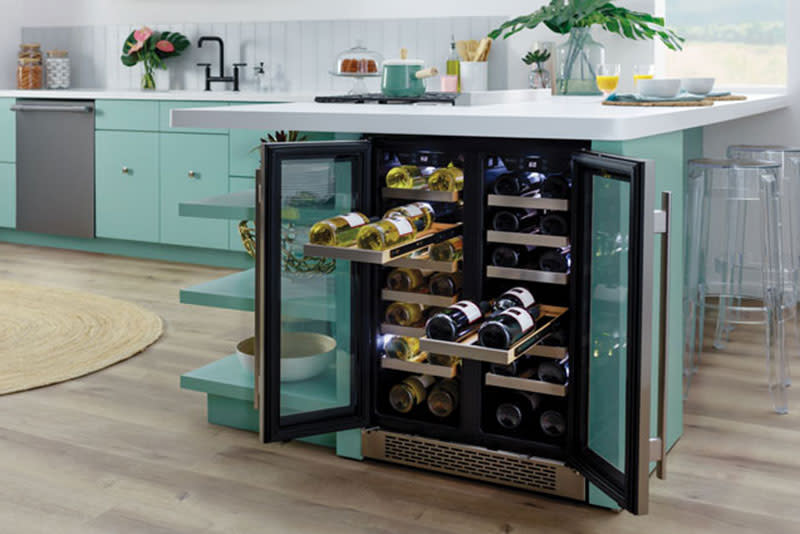
As a wine enthusiast, you understand the importance of savoring a fine bottle of wine at the ideal temperature to fully appreciate its flavor. That’s why wine coolers are an excellent solution, providing a convenient and stylish way to store and cool your beloved wine collection.
Various types of wine coolers are available to meet different needs and preferences. Here are some of the most sought after ones:
- Single-zone wine coolers
Single-zone wine coolers are the go-to choice for individuals who predominantly enjoy one type of wine, which requires consistent storage conditions. These coolers maintain a constant temperature throughout the interior, making them ideal for red or white wine enthusiasts. They typically come in various sizes to accommodate different bottle capacities and can be freestanding or built into cabinetry.
- Dual-zone wine coolers
Dual-zone wine coolers feature two separate temperature zones, allowing you to store your reds and whites at their ideal serving temperatures simultaneously. This versatility makes them a popular choice among wine enthusiasts with diverse tastes.
- Built-in wine coolers
Built-in wine coolers are designed to seamlessly integrate into your kitchen or bar area, providing a sleek and customized appearance. They often have front ventilation systems, making them suitable for under-counter installation. These coolers cater to wine enthusiasts who prioritize aesthetics and space efficiency.
- Freestanding wine coolers
Freestanding wine coolers are versatile and can be placed anywhere with proper ventilation. They are an excellent choice for those who prefer a more flexible approach to wine storage. These coolers come in various sizes and designs, ranging from countertop units to tall, standalone models.
- Countertop wine coolers
Countertop wine coolers are compact and convenient, making them an excellent choice for individuals with limited space. They are typically single-zone units designed to store a small collection of wines at the perfect temperature. These coolers are ideal for apartments, offices, or small kitchens.
- Under-counter wine coolers
Under-counter wine coolers are built to fit seamlessly beneath kitchen counters or bars. They offer a space-saving solution for those who want easy access to their wine collection without sacrificing floor space. These coolers are available in both single-zone and dual-zone configurations.
- Tall wine coolers
Tall wine coolers are designed for serious wine collectors. These units often have a large bottle capacity and advanced features like humidity control, UV-resistant glass doors, and precise temperature settings. They are perfect for aging and preserving your wine collection.
- Thermoelectric wine coolers
Thermoelectric wine coolers are known for their energy efficiency and quiet operation. They use a cooling system based on the Peltier effect and are perfect for storing wine in smaller spaces, such as apartments or bedrooms. While they might not provide the same temperature consistency as compressor-based coolers, they are still an excellent choice for short-term storage.
- Compressor wine coolers
Compressor wine coolers are the workhorses of wine storage. They offer precise temperature control and are suitable for long-term aging. These coolers are often found in larger wine cellars and commercial establishments, where temperature stability is paramount.
From single-zone coolers for simplicity to dual-zone models for versatility, and from built-in options for seamless integration to freestanding units for flexibility, the world of wine coolers offers a wide array of choices.
Understanding these types will help you make an informed decision, ensuring that your favorite wines are always stored and served at their best.
Tips for choosing the best wine cooler
When choosing a wine cooler, there are several important factors to consider to ensure that it meets your specific needs and preferences.
Here are some tips to assist you in making an informed decision:
- Purpose
The first decision you’ll need to make is whether you primarily need a wine cooler for storage or serving. Wine coolers designed for storage maintain a consistent temperature, ideal for aging your wine collection. On the other hand, serving wine coolers offer precise temperature control, ensuring your wine is ready to be enjoyed at the perfect serving temperature. Knowing your purpose is the first step towards selecting the right wine cooler.
- Placement options
Where you plan to place your wine cooler is another vital consideration. Wine coolers come in three main installation types: free-standing, built-in, and integrated. Free-standing units offer flexibility in placement, built-in models seamlessly fit into your kitchen cabinetry, while integrated wine coolers are concealed behind custom panels for a sleek look. Consider your available space and aesthetic preferences when choosing the placement option that best suits your needs.
- Selecting the right size
The size of your wine cooler is a crucial factor to consider. Think about the number of bottles you plan to store and the available space in your home. Wine coolers come in various capacities, ranging from compact countertop models to large, built-in units capable of storing hundreds of bottles.
- Bottle capacity
Another vital aspect to ponder is the refrigerator’s bottle capacity. Assess your current wine collection and project how it may grow in the future. A wine cooler with a capacity that accommodates your collection’s growth ensures you won’t outgrow your storage solution. Adequate bottle capacity is essential for maintaining an organized and accessible wine collection. Choose a size that aligns with the size of your wine collection and your storage needs.
- Temperature control
Maintaining the right temperature is vital for wine storage. Most wine experts recommend keeping red wine at around 55°F (13°C) and white wine at 45-50°F (7-10°C). Look for a wine cooler with precise temperature control and minimal temperature fluctuations.
- Temperature zones
Wines come in various styles, and each type has its optimal serving and storage temperature. Consider a wine cooler with multiple temperature zones to cater to different varietals and their specific requirements. This feature allows you to maintain reds, whites, and sparkling wines at their ideal temperatures simultaneously, ensuring that each bottle is enjoyed to the fullest.
- Anticipated storage time
Consider how long you plan to store your wines. If you intend to age your wines for an extended period, invest in a refrigerator with advanced temperature and humidity control. Proper aging conditions are vital to ensure your wines mature gracefully and develop complex flavors over time.
- Cooling components
The cooling system of a wine refrigerator plays a pivotal role in preserving your wine collection. Opt for a unit with a reliable and efficient cooling mechanism. Compressor-based systems offer consistent temperature control and are ideal for long-term storage. Thermoelectric cooling is another option, known for its quiet operation and suitability for smaller collections. Choose the cooling component that aligns with your storage needs and preferences.
- Humidity control
Humidity levels between 50% and 70% are ideal for wine storage. Proper humidity prevents corks from drying out and wine from oxidizing. Some wine coolers come with humidity control features to maintain these optimal conditions.
- UV protection
Ultraviolet (UV) light can be detrimental to wine, causing premature aging and degradation of flavors. Choose a wine cooler with UV-resistant glass or solid doors to shield your bottles from harmful UV rays.
- Vibration control
Vibrations can disturb the sediment in wine bottles, affecting their aging process. Invest in a wine cooler with vibration reduction technology, such as rubber-mounted compressors, to keep your wine undisturbed.
- Energy efficiency
Energy efficiency is not only an environmental concern but also a financial one. Wine coolers vary in their energy consumption levels. Consider your commitment to sustainability and your energy bill when choosing a wine cooler. Look for units with Energy Star certification, which typically indicate more efficient operation, ultimately saving you money in the long run.
- Noise level
Some wine coolers can be noisy, which can be bothersome if you plan to place them in a living area or kitchen. The noise level of your wine cooler can affect your overall satisfaction with it. Some wine coolers can produce a noticeable hum, while others operate quietly. If you plan to place your wine cooler in a shared living space or a quiet environment, consider a quieter model to avoid any disruptions. Look for wine coolers with advanced insulation and compressor technology for a more tranquil wine storage experience. Check reviews and specifications for information on noise levels to ensure it won’t disrupt your daily life.
- Shelf life
When selecting a wine cooler, think long-term. Check the build quality and durability of the wine cooler. Stainless steel interiors and UV-protected glass doors are features that can enhance the longevity of the unit. Assess the unit’s durability, build quality, and warranty to ensure it can withstand the test of time. A reliable cooler should provide years of dependable service, safeguarding your precious wine collection.
- Design, details, and features
Lastly, pay attention to the design, details, and features of the wine cooler. The aesthetic appeal of your wine cooler can enhance the overall ambiance of your space. Some wine coolers offer advanced features such as UV-resistant glass doors, interior LED lighting, and adjustable shelving to accommodate different bottle sizes. Explore these additional features to find a wine cooler that not only performs well but also complements your style and preferences.
- Budget considerations
Wine coolers come in a wide price range, from budget-friendly options to high-end, premium units. Set a budget that aligns with your needs and preferences, and research models within that range to find the best value for your money.
Choosing the right wine refrigerator is a thoughtful process that requires consideration of various factors.
You can ensure your wines are stored and served at their best by carefully evaluating the size, bottle capacity, temperature zones, cooling components, anticipated storage duration, and unit’s shelf life.
What’s the difference between a wine cooler and a wine refrigerator?
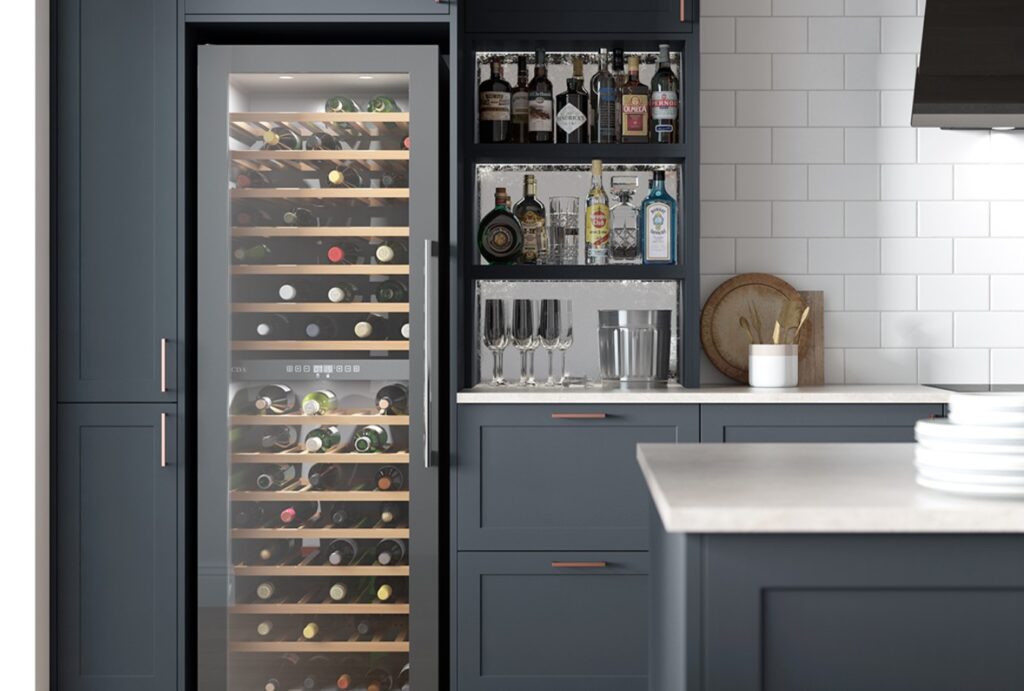
When preserving your precious wine collection, choosing the right storage solution is crucial. The terms “wine cooler” and “wine refrigerator” are often used interchangeably, but there are significant differences between the two that can impact the quality of your wine.
The key differences are temperature control, humidity, site, capacity, noise levels, price range, aesthetics, and design.
Temperature zones
Consider whether you predominantly drink red, white, or both types of wine. If you enjoy both, a dual-zone cooler is essential to maintain optimal serving temperatures for each.
Temperature control
Temperature plays a pivotal role in wine preservation.
- Wine cooler: Wine coolers typically offer temperature control within a limited range, usually between 45°F to 64°F (7°C to 18°C). They are suitable for short-term storage and serving, ensuring your wine is at the right temperature for immediate enjoyment.
- Wine refrigerator: Wine refrigerators provide more precise temperature control. They maintain consistent temperatures, often between 40°F to 65°F (4°C to 18°C), and are ideal for long-term aging and preserving the complex flavors of your wine.
Humidity levels
Humidity is another critical factor in wine storage.
- Wine cooler: Wine coolers may not always have humidity control features. As a result, they may not be as effective at maintaining the ideal humidity levels for long-term wine storage.This can lead to fluctuations in humidity levels, which may affect the integrity of your wine labels and corks over time.
- Wine refrigerator: Wine refrigerators come equipped with humidity control features that maintain an optimal level of humidity (around 50-70%). This ensures the corks remain moist, preventing oxidation and wine spoilage.
Purpose
- Wine Cooler: Wine coolers are primarily used for short-term storage and serving purposes. They are ideal for keeping wines ready to be enjoyed relatively soon.
- Wine Refrigerator: Wine refrigerators are designed for both short-term and long-term wine storage. They provide a more stable and customizable environment for aging and preserving wines over extended periods.
Size and capacity
The size of your wine storage solution depends on the size of your wine collection.
- Wine cooler: Wine coolers are generally smaller and have a limited capacity, making them suitable for individuals or small collections of up to 50 bottles.
- Wine refrigerator: Wine refrigerators come in various sizes and capacities, ranging from small units to large cabinets capable of holding hundreds of bottles. They are ideal for serious wine enthusiasts or collectors.
Noise levels
The noise emitted by your wine storage unit can be a factor to consider.
- Wine cooler: Wine coolers tend to be quieter due to their simpler cooling systems, making them suitable for placement in living areas or kitchen spaces.
- Wine refrigerator: Wine refrigerators, especially larger ones, may produce more noise, which can be a concern if you plan to place them in shared living spaces.
Price range
Your budget is undoubtedly a significant factor in choosing between a wine cooler and a wine refrigerator.
- Wine cooler: Wine coolers are generally more affordable, making them an attractive option for those on a budget or with smaller wine collections.
- Wine refrigerator: Wine refrigerators, especially those with advanced features and larger capacities, tend to be more expensive. However, they offer superior temperature control and storage options for serious wine collectors.
Aesthetics and design
The appearance of your wine storage unit can be a deciding factor, especially if it’s on display.
- Wine cooler: Wine coolers often come in a variety of stylish designs and finishes, allowing them to blend seamlessly with your decor.
- Wine refrigerator: Wine refrigerators also offer aesthetically pleasing options, but their larger size may limit placement choices.
While wine coolers are designed for short-term storage and serving wine at a moderately cool temperature, wine refrigerators provide more precise temperature control, humidity management, and flexibility for both short-term and long-term wine storage needs.
The choice between a wine cooler and a wine refrigerator depends on your wine storage goals and the size of your wine collection.
To help you find the perfect wine cooler or refrigerator for your needs, we have compiled a list of our top seven picks.
What kind of wine cooler do I need?
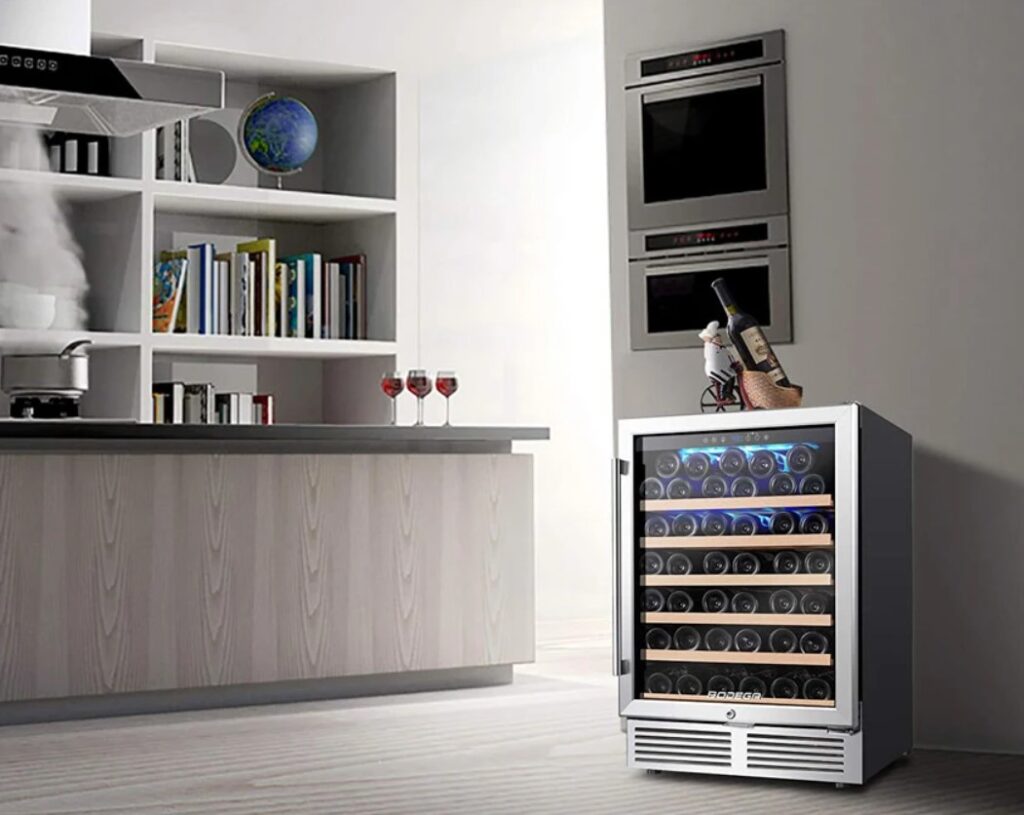
When choosing a wine cooler, it’s important to consider several factors to ensure it meets your specific needs. Consider the following factors:
- Size of collection: Are you a collector with hundreds of bottles, or do you have a small selection for personal consumption?
- Wine types: Do you primarily collect red, white, or both? Some wine coolers are designed to accommodate specific types.
- Long or short-term storage: Are you looking for short-term storage or planning to age your wines for years? Long-term storage requires stable temperature and humidity control.
- Define which types of wine coolers would suit your needs: choose between freestanding, built-in, single or dual-zone, compressor or thermoelectric ones.
- Temperature and Humidity Control: Most wines are best stored between 45°F (7°C) and 65°F (18°C). However, reds and whites have specific temperature preferences. Compressor coolers offer precise temperature control.
- Humidity: Ideal humidity levels range from 50% to 70% to prevent corks from drying out and wine from oxidizing. Thermoelectric coolers may not be as effective at humidity control as compressor models.
- Size and capacity: Consider the physical dimensions of the wine cooler and whether it can accommodate your collection’s size. A common rule of thumb is that a standard 24-inch-wide wine cooler can hold around 48 bottles, but this can vary depending on the design and size of the bottles.
- Define wanted additional features: Modern wine coolers come with a range of features such as UV Protection, security lock, LED lighting, shelving. UV rays can harm wine. Look for coolers with UV-resistant glass doors or solid doors to protect your collection. Ensure your wines are safe from curious hands with a built-in lock. LED lights not only showcase your collection but also generate less heat than traditional bulbs. Adjustable and wooden shelves can be beneficial for organizing and protecting your wine bottles.
Choosing the right wine cooler is essential for preserving the flavor and quality of your wine collection.
By understanding your specific needs, considering factors like the type of cooler, temperature control, size, and additional features, you can confidently select the perfect wine cooler to suit your needs.
|
$339.99
|
N/A
|
$999.00
|
Energy-efficient wine coolers: Tips for reducing energy consumption
To make your wine cooler more energy-efficient and reduce its energy consumption, consider the following tips:
- Proper location: Ensure that your wine cooler is placed in a cool, dry area away from direct sunlight and heat sources. This helps reduce the workload on the cooler as it won’t need to work as hard to maintain the desired temperature.
- Optimal temperature settings: Set the temperature within the recommended range for wine storage, typically between 45°F and 65°F. Keeping it within this range ensures the cooler operates efficiently without unnecessary cooling or heating.
- Energy-efficient models: Invest in an energy-efficient wine cooler. These models are designed to consume less energy while still maintaining the ideal wine storage conditions. Look for models with energy-efficient features and technologies.
- LED lighting: Many energy-efficient wine coolers come equipped with LED lighting systems. LED lights are energy-efficient and consume less power compared to traditional lighting, reducing overall energy consumption.
- Size and capacity: Choose a wine cooler that matches your storage needs. Larger coolers may have higher power consumption, so selecting a size that suits your collection can help minimize energy use.
Is a wine cooler a good investment?
Investing in a wine cooler can be a good decision for wine enthusiasts and collectors for several reasons. Firstly, a wine cooler helps to maintain the quality of your wine over time by providing a controlled environment for storage.
It regulates temperature and humidity levels, ensuring that your wine ages gracefully and retains its flavors. This is especially important if you have valuable or aged bottles in your collection.
Secondly, owning a wine cooler can potentially increase the value of your wine collection. Proper storage conditions can enhance the taste and aroma of your wines, making them more appealing to potential buyers or for personal enjoyment.
If you plan to sell or showcase your wine collection in the future, a wine cooler can be a valuable asset.
Additionally, wine coolers come in various sizes and price ranges, making them accessible to a wide range of budgets. Whether you have a small or extensive wine collection, there are options available that can fit your needs and preferences.
Furthermore, a wine cooler can be a space-saving solution compared to traditional wine cellars. It allows you to store your wine collection efficiently without the need for a dedicated cellar or basement space.
In summary, investing in a wine cooler is worth considering for those who are passionate about wine and want to ensure the longevity and quality of their collection. It can add value to your wines and provide a convenient and efficient storage solution.
The Wine Enthusiast 6-Bottle Countertop Wine Cooler is a must-have for wine enthusiasts seeking affordable small wine cooler, offering an elegant and compact design that accommodates up to six standard-sized bottles.
Why are wine coolers so expensive?
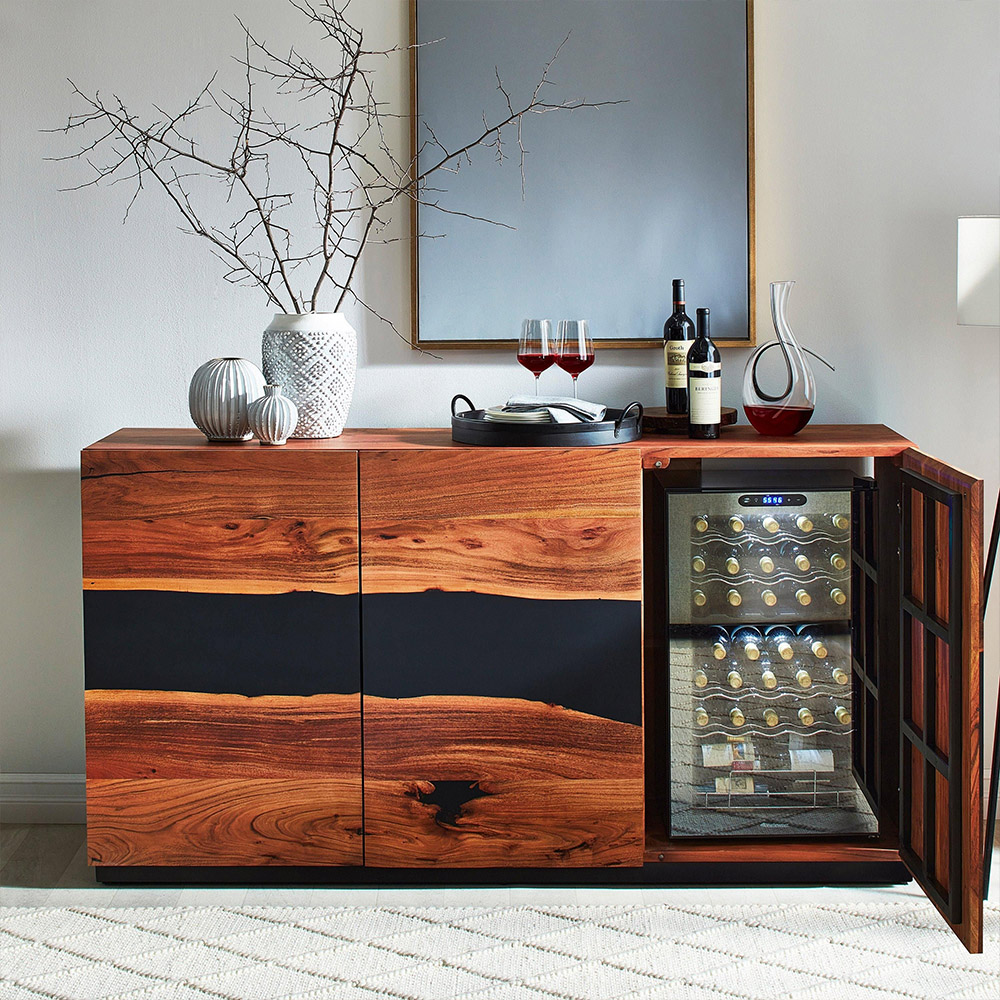
Wine coolers are often more expensive than home refrigerators for several reasons. These specialized appliances are designed to meet specific requirements for storing wine, which makes them more costly.
Here are some key factors contributing to the higher price tag of wine coolers:
- Temperature control technology: Wine coolers are equipped with advanced temperature control technology that allows them to maintain a stable and precise temperature range suitable for storing wine. This technology ensures that your wine is stored at the ideal temperature, which is crucial for preserving its quality and taste.
- UV-blocking glass: Many wine coolers feature UV-blocking glass doors or panels. This glass helps protect your wine from harmful UV rays, which can degrade the quality and flavor of the wine over time. The use of such specialized materials adds to the cost of manufacturing.
- Humidity control: Maintaining the right humidity level is vital for wine storage. Wine coolers often include humidity control units to ensure that the environment inside the cooler remains optimal for wine. These units can be complex and contribute to the overall expense.
- Design and craftsmanship: Wine coolers are often designed with specific wine bottle storage in mind. The racks and shelving inside these coolers are carefully crafted to accommodate wine bottles of various shapes and sizes. This attention to detail adds to the overall cost.
- Energy efficiency: Some larger wine coolers are designed to be energy-efficient, which can lead to higher upfront costs. However, this efficiency can help reduce long-term operating expenses.
- Limited production: Wine coolers are not produced in the same quantities as standard refrigerators, resulting in higher manufacturing costs per unit. Additionally, they might be built to fit into specific spaces or as built-in appliances, which further increases manufacturing complexity.
Who makes the best wine coolers?
When it comes to determining who makes the best wine coolers, it largely depends on your specific preferences, needs, and budget. There are several reputable brands and models known for their quality wine coolers. Here are some options that have been well-regarded as of my last knowledge update in September 2021:
- Wine Enthusiast: Wine Enthusiast offers a range of wine coolers and has been a popular choice for wine enthusiasts. Their VinoView and Dual Zone MAX Compressor Wine Cooler have received positive reviews.
- EuroCave: EuroCave is known for its premium wine fridges, and they offer a wide selection of high-end wine storage solutions. A pioneer in wine storage, EuroCave is synonymous with sophistication and precision, with coolers designed for the most discerning oenophiles.
- EdgeStar: EdgeStar manufactures various wine coolers, including the Duall Zone Wine Cooler and the Built-In Cooler, which have received positive feedback for their performance.
- Samsung: Samsung is a well-known electronics brand that also produces wine coolers. Their wine coolers are often praised for their sleek design and functionality.
- Vinotemp: Well-known company specializing in wine storage solutions and accessories. They offer a wide range of products, including wine coolers, wine cabinets, wine racking systems, and are known for their expertise in custom wood wine cabinets and wine-related appliances.
- Kucht: Kucht offers the triple temperature zone Wine Cooler, which is known for its large storage capacity and versatility.
- NewAir: Combining affordability with functionality, NewAir wine coolers are celebrated for their energy efficiency and sleek designs.
- Haier: With a global reputation for quality appliances, Haier’s wine coolers are known for their reliability and affordability.
It’s essential to consider factors such as the size of your wine collection, the available space in your home, and any specific features you may want in a wine cooler, such as dual-zone temperature control or built-in options.
Conclusion
Choosing the right wine cooler is an investment in your wine collection and enjoyment. Consider your specific needs, available space, and budget when making your decision.
With various types of wine coolers available on the market, understanding your specific needs and preferences is key to making an informed decision.
Whether you opt for a single-zone, dual-zone, built-in, freestanding, countertop, thermoelectric, or compressor wine cooler, the choice ultimately depends on your unique requirements.
By considering capacity, temperature zones, size, noise level, budget, and additional features, you can confidently choose the best wine cooler to elevate your wine enjoyment experience.
With the knowledge gained from this guide and thorough research, you can confidently select a wine cooler that will enhance your wine experience and ensure your bottles are always ready to be uncorked and savored.
Our Expertise
Valentina Silovic is a sommelier and content creator with over a decade of experience in the wine industry.
For this article, she collaborated with Dario Drmac, a wine entrepreneur renowned for his innovative digital approach, and Nenad Trifunovic, an esteemed moderator, wine workshop educator, and dedicated advocate for wine-drinking culture.
Their combined experience and insights contribute significantly to the depth and authority of the content presented.
Want to meet the team, seek recommendations, and discover in-depth insights into our product testing and reviews? Click here now!


